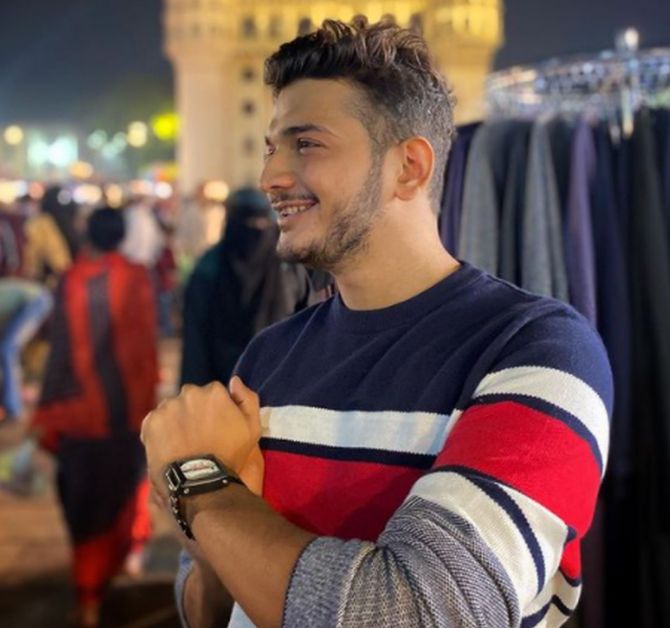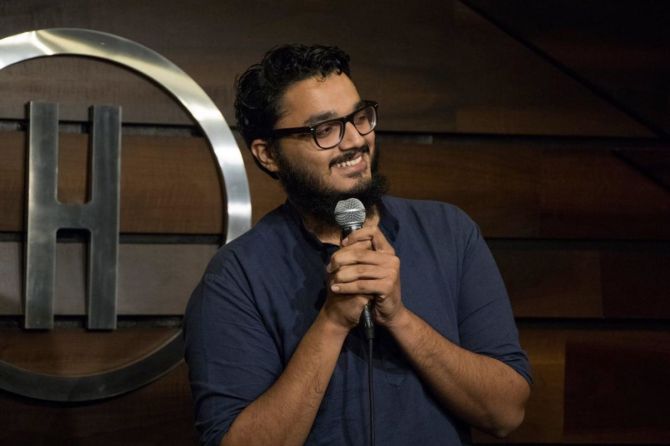 | « Back to article | Print this article |
He may have been in the news for all the wrong reasons but the greater irony is that Muslim stand-up comic Munawar Faruqui's best jokes ridicule Muslims, and are wolfed down by Muslims, who form the majority of his 177,000 Instagram followers, notes Jyoti Punwani.

The Supreme Court's decision to grant bail to Munawar Faruqui has angered some.
'A Muslim who made fun of Hindu deities' didn't deserve bail, some posted on social media, while some others have expressed the hope that Faruqui's 36-day stint in jail will have 'taught him a lesson never to mock Hindu deities again.'
Leave aside the fact that even the police admitted there was no evidence that Faruqui made fun of Hindu deities at the show for which he was arrested.
The greater irony is that this Muslim stand-up comic's best jokes ridicule Muslims, and are wolfed down by Muslims, who form the majority of his 177,000 Instagram followers.
During Ramzan last year, forced to stay home because of the lockdown, Faruqui created the character 'Razzak Bhai' and posted brief comic videos on Instagram about Roza with Razzak Bhai.
These posts showed Razzak Bhai sleeping most of the day, fantasising about street food rendered inaccessible by the lockdown, quarreling with neighbours who disturbed his sleep, and chatting with ex-girlfriends at night. He spoke Bambaiya Hindi, and was a "typical tapori Muslim", to quote fellow stand-up comic Saad Shaikh.
In Faruqui's video Dawood, Yamraaj & Aurat, the joke's on the typical Muslim biker known for his disregard for traffic rules, and his thin burqa-clad girlfriend who clings to him so tight on his bike that she leaves enough space behind her for an extra seat, 'like an invitation for a second wife'.
The video, which also makes fun of the popular perceptions about Mumbai's old Muslim quarter Dongri, has received more than four million views on YouTube.
Non-Muslims in India don't often hear their Muslim friends crack jokes about their own community.
It's not as if Muslims don't laugh at themselves. Ghalib is probably the best known poet who mocked the hypocrisies of his own faith. Pakistanis have a long tradition of self-mockery; their jokes about maulanas have been famous for decades.
The confidence to ridicule one's own community in front of others can only spring from a sense of security and self-confidence.
Ghalib belonged to the last phase of the Mughal empire, aeons away from the post-Partition era wherein Muslims have been, by and large, a besieged minority.
Watching Faruqui's shows, you realise that this audacious self-confidence which was the privilege of the majority community, is now a hallmark of young urban Muslims.

Saad Shaikh points to the humour on 'Muslim Twitter', and to Facebook pages run by Muslims that thrive on jokes about Muslims.
He and Faruqui began performing at the same time, in 2018.
"At that first show, both of us were the only Muslims in the hall," recalls Shaikh. "We were joking about everyday things that we encountered, trying to break stereotypes about Muslims, to show that we are no different from anyone else. The audience loved it."
Faruqui's many jokes on living in Dongri have also been aimed at breaking the stereotype about the area being a "mini-Pakistan". "That's how my Hindu friend described it to me," says Shaikh wryly.
"Munawar talks about mundane Muslim life in Dongri, boys wanting to patao girls, to look handsome -- exactly what happens in every locality," he adds.
Says Delhi-based journalism student and Munawar Faruqui fan Kalim Ahmed, "You can find several Muslim comedians, but there's a key difference -- Munawar is one who actively asserts his identity. He is someone people relate to because he's a practising Muslim."
"I'm not trying to insult other Muslim comedians by saying this," explains Ahmed. "The thing is, Munawar's faith has actually inculcated other people into his fandom. People feel represented because of the way he is."
The response to Faruqui's 'Razzak Bhai' series bears this out.
The series, which says Shaikh, was not rated very highly by Faruqui himself, became popular across the country, because "Muslims living in Muslim areas, be it in Delhi or Lucknow, Mumbai or Hyderabad, could relate to it."
There's another aspect of Faruqui's shows that is remarkable, but to understand its significance, one must recall Shaheen Dhada.
In 2012, this 21-year-old Palghar, Maharashtra, resident expressed her disapproval on Facebook of the way Mumbai was forced to shut down when Shiv Sena supremo Bal Thackeray died.
The fact that she was a Muslim didn't deter her from speaking her mind. Shaheen was just a year old when the 1992-1993 riots broke out; the ghosts of those dark days didn't haunt her.
The decade that has gone by since then has given us Munawar Faruqui.
Apart from being comfortable asserting his Muslim-ness, Faruqui also comes across in his shows as a modern cosmopolitan Mumbaikar, totally at ease with the mixed culture of this metropolis.
A good example of this is the first episode of Veg Biryani, where he and Shaikh perform with Anish Goregaonkar and Sagar Punjabi. All four stand-up artists make fun of the dowry practices of all communities, and of one another's communities too.
In it, Shaikh refers jokingly to himself as the Tableeghi Jamaat chief who bears the same name (Maulana Saad); Punjabi tells him he should be singing bhajans and then corrects himself: "Sorry, I meant qawwalis, you can't sing bhajans."
This is the kind of openness that's seen only among close friends belonging to different communities, where there is little likelihood of anyone taking offence.
That this openness can today be displayed on stage and find takers among mixed audiences, shows how relaxed the urban youth at least have become about religious and regional identities.
 IMAGE: Munawar Faruqui fan Kalim Ahmed.
IMAGE: Munawar Faruqui fan Kalim Ahmed.There was a time when Muslims felt as much at ease referring to Hindu deities and traditions as they did to their own. But these were mainly Muslims who had grown up in villages, nurtured by a shared culture.
Those who migrated to big cities, be they Hindu or Muslim, tended to stick to their own kind, and inhabited only their own cultures.
That a stage has been reached wherein city-dwelling youngsters of both the major communities are comfortable with each other's customs and traditions, is something to marvel at, something that seemed like a distant dream for those of us who lived through the Ayodhya movement.
But that we have reached this stage must frighten Hindutvawadis, and indeed, the orthodox of both communities.
Like Shaheen Dhada, Faruqui too has had to pay for his self-confidence. But the furore that ensued when Dhada and her Hindu friend were arrested for a Facebook post, ensured that they were discharged a month later.
Faruqui's nightmare has been worse.
Will his experience see a break in this self-assured, mature phase that has taken us 70 years to reach?
Going by the comments on his YouTube and Instagram videos after his arrest, it's clear that support for Munawar Faruqui is, fortunately, not confined to his community alone. Hindus are rooting for him as much as Muslims.
States must ensure that 'the ecosystem and sustenance of coexistence in our society is not polluted by negative forces,' Justice Rohit Arya of the Madhya Pradesh high court had urged, rejecting Faruqui's bail application.
Indeed, negative forces in Indore could not pollute the ecosystem that sustains artists such as Munawar Faruqui.
Feature presentation: Aslam Hunani/Rediff.com.